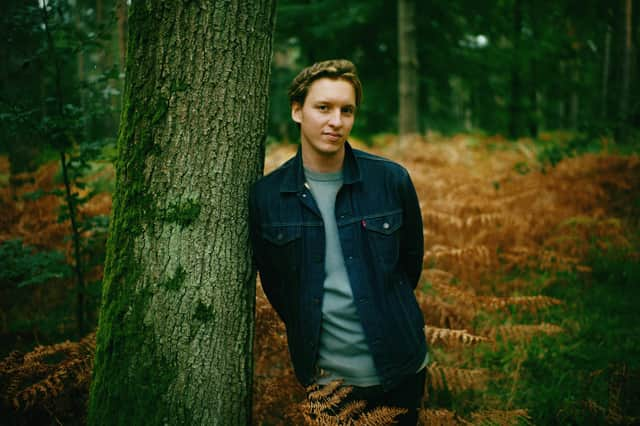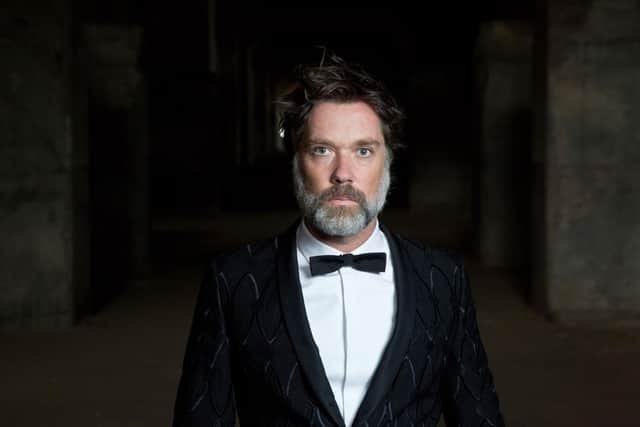Album reviews: George Ezra | Angel Olsen | Rufus Wainwright | Susan Bear


George Ezra: Gold Rush Kid (Columbia) ***
Angel Olsen: Big Time (Jagjaguwar) ****
Rufus Wainwright: Rufus Does Judy at Capitol Records (BMG) ***
Susan Bear: Alter (Lost Map) ****
When you are as successful as George Ezra you can probably present any creative idea to your paymasters on the understanding that it will make money – in Ezra’s case, the plan was to write his third album as he walked from Land’s End to John O’Groats. This is not quite as fanciful as it sounds, as Ezra did eventually undertake the trek for a forthcoming documentary feature, End to End.
Advertisement
Hide AdAdvertisement
Hide AdGold Rush Kid was actually written in the less challenging setting of the farm in Hertfordshire where Ezra spent some of lockdown, close to his family, and was recorded with regular collaborator Joel Pott. The music is suitably comforting in its accessibility and positivity. Once again, Ezra has bottled summer with the undemanding radio-friendly earworms of carefree taster singles Green Green Grass and Anyone For You, which stitch together some generalised I’ll-be-there-for-you sentiments.
There is more banal but upbeat lyricism on the title track with its intentions of “making a run for it and learning to dance” designed to produce an easy smile or a shoulder shimmy. Following previous singles Budapest and Barcelona, Ezra continues his tour of world cities with Manila – the effect is one of simple escapism, a momentary respite from daily travails.


There is an art to such mindless catchiness, and Ezra is adept at creating a safe space for such melodramatic notions as Fell In Love at the End of the World.
His mid-paced music provided the catchy soundtrack to Joe Wicks’s lockdown exercise classes and he has included a token dance pop tune, Dance All Over Me, in the tracklisting. But Ezra becomes more reflective towards the end of the album on the openly sentimental ballad Sweetest Human Being Alive and the pastoral peace of Sun Went Down. The irony is that such resolutely non-earth-shattering fare could just make someone’s day a whole lot better.
Angel Olsen’s latest album was forged against a personal backdrop of highs and lows – the high of new love and being able to come out to her parents, the low of losing both her dad and her mum within a matter of months. Big Time is another work of ravishing symphonic country pop, produced by her usual wingman Jonathan Wilson in such a way that her rich alto is always the star instrument. She harmonises beautifully with herself adding soaring soprano to the mix on All the Good Times, utilises the sob in her voice on This Is How It Works’ appeal for support and understanding and emits a cry from the heart on gothic pop number Go Home with its desire to “go back to small things”.
Rufus Wainwright is back on the Judy Garland train, rattling through The Trolley Song, razzle-dazzling on Puttin’ on the Ritz and riding the rollercoaster of Come Rain or Come Shine with full orchestral backing on Rufus Does Judy at Capitol Records. Wainwright has a natural affinity for Garland melodrama but he is arguably at his strongest when he is most vulnerable on the languorous soul of I Can’t Give You Anything But Love, the happy-sad A Foggy Day and backed by jazz guitar on How Long Has This Been Going On. However, the awkward mash-up of Get Happy and Happy Days Are Here Again, with Kristin Chenoweth overlapping on the latter, is a gimmicky misfire.


Multi-instrumentalist and producer Susan Bear started her Lost Map Records association as one half of indie duo Tuff Love and has flourished on her own and in collaboration. Her latest solo album is a gloriously dreamy affair, featuring the blissful synth pop of Slack, sonorous piano flourishes of Alexandra and the happy marriage of twinkling indie and fuzzy distortion on Mario Golf 2.
CLASSICAL
Advertisement
Hide AdAdvertisement
Hide AdPrecious Things: Choral Music by Bernard Hughes (Delphian) ****
Precious Things is a portrait album featuring choral music written over the last decade by the English composer Bernard Hughes. He’s maybe not a household name, but revealed here is a composer whose music, engagingly sung by The Epiphany Consort under Tim Reader, bears a fundamentally traditional hallmark, yet enjoys enough stylistic freedom to venture into more experimental realms. The title track is a case in point, settings of poets he knows personally (Antony Dunn, Helen Eastman and Andrew George). The central one – Helium – is fantastically evocative, the soaring glissandi voices evoking the sky-bound inevitability of a helium balloon. The carol The Linden Tree is simple and sublime, catchy rhythms light up the Psalm 56 and Jubilate Domino settings, while lengthier groupings such as I Sing of Love and A Ternary of Littles find Hughes exploring a diversity of possibilities, from quiet luxuriance to seductive exuberance. Ken Walton
JAZZ
Seonaid Aitken Ensemble: Chasing Sakura (Own Label) *****
Swing violinist and singer Seonaid Aitken composed this richly textured, jazz, folk and classically inflected suite following a serious accident. Her ensemble of violinist Katrina Lee, Patsy Reid on viola, cellist Alice Allen, double-bassist Emma Smith and Helena Kay on tenor saxophone and flute generate a dazzling sense of transcendence as Aitken, who has lived in Japan, is inspired by the cherry blossom she witnesses as she recovers in a Glasgow transformed by spring. The opening Awakening establishes the mood, with Aitken’s solo violin and Kay’s tenor sax sounding against a flurry of strings, the sense of anticipatory excitement developed in the bustling title track. Elsewhere, there’s the swingy waltz of Beauty and Wonder, lithe fiddle and sax dialogue in The Walk and vocalising from Aitken in the dreamy Spring Song, while avian flute and a Japanese mode colour the elegant glide of Sakura Snowstorm. Jim Gilchrist